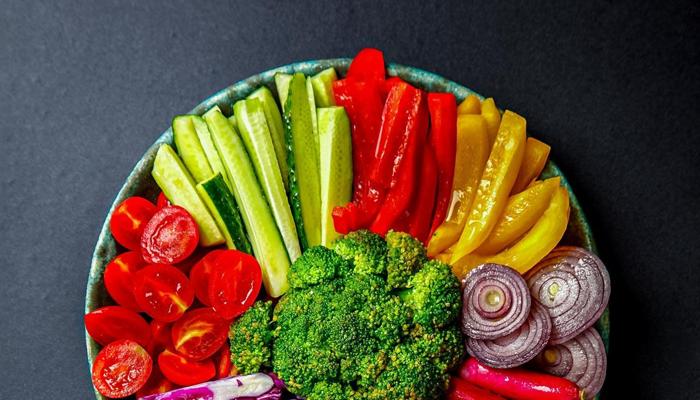Unlock 5 Essential Tips for Crafting a Balanced and Nutritious Meal Plan: Your Guide to Swasth Jeevan! Dive in for a healthier you!
Namaste, readers! In today's fast-paced world, juggling work, family,
and everything in between can often leave our health taking a backseat. We all know that eating right is important, but figuring out what to eat and how to plan it can seem like a monumental task, right?
But don't worry, no need to get tensed! We're here to simplify things for you. This article will give you five essential tips to create a balanced and nutritious meal plan, easy-peasy, lemon squeezy!
Think of it as your guide to a healthier and happier you, one delicious and nutritious plate at a time. So, grab a pen (or open your notes app!), and let's get started on this journey to swasth jeevan, a healthy life!
It doesn't have to be complicated; imagine creating a plan that supports your energy levels, boosts your immunity, and even makes you feel good from the inside out. We're talking about simple changes that can lead to big results. Are you ready to take charge of your health and well-being?
Let's dive in!
Understand nutritional needs based on age, activity level, and health for optimal functioning
First things first: understand your nutritional needs. This is like knowing the blueprint before you start building your house. What does your body actually need to function at its best? Age, gender, activity level, and any underlying health conditions all play a role.

A young athlete, for example, will have different requirements than a senior citizen who leads a moderately active lifestyle. Focus on understanding your daily energy requirements. Start by figuring out your Basal Metabolic Rate (BMR), which is the number of calories your body needs at rest.
You can find BMR calculators online, or consult a dietician for personalized guidance. Next, consider your activity level.
Sedentary jobs requiring little movement require a calorie intake that matches that but if you're actively involved in physical activities then you should take in extra calories that fuel your performance. Once you know your BMR and activity level, you can calculate your daily calorie needs.
Remember this isn't a license to eat anything or everything! It's about making informed food choices within your calorie range. Now, let's talk about macronutrients – carbohydrates, proteins, and fats. These are the building blocks of your diet. Aim for a balanced ratio.
A commonly recommended distribution is 45-65% of your calories from carbohydrates, 10-35% from protein, and 20-35% from fat. Proteins are essential for building and repairing tissues, carbohydrates provide energy, and healthy fats support brain function and hormone production.
Don't forget micronutrients like vitamins and minerals! These are vital for overall health and well-being. A colorful plate filled with fruits and vegetables is your best bet for getting a wide range of micronutrients.
Consulting a registered dietician or nutritionist can provide tailored recommendations based on your individual needs and health status.
Embrace the power of planning for healthier eating habits
Next up: embrace the power of planning! Planning helps you control what you eat. It prevents impulsive eating of unhealthy foods when hunger strikes. So, block out a little time each week, maybe on a Sunday afternoon, to plan your meals for the coming week. First, take a look at your schedule.
Do you have any particularly busy days where you'll need quick and easy meals? Are there days when you'll have more time to cook? This will help you decide what types of meals to plan for each day. Now, brainstorm some meal ideas. Think about dishes you enjoy that are also nutritious.
Look for recipes online or in cookbooks. Don't be afraid to experiment with new ingredients and flavors! Include a variety of fruits, vegetables, whole grains, lean protein, and healthy fats in your meal plan. Once you have some meal ideas, create a shopping list.
This will ensure you have all the ingredients you need on hand, and it will help you avoid impulse purchases at the grocery store. Stick to your shopping list when you go to the store. It's so easy to get derailed by tempting treats, but remember your goals!
When you get home from the store, prep your ingredients. Chop vegetables, cook grains, or marinate protein. This will save you time during the week when you're busy. It's also helpful to cook larger batches of food and freeze portions for future meals.
This is a great way to have healthy options on hand even when you don't have time to cook. Make breakfast, lunch, and dinner something to look forward to. Get in the action and experience a healthier change in your lifestyle.
By making this a habit, you’re more likely to stick to healthy diet in the future.
Incorporate colorful fruits & veggies for optimal health
Now for the fun part: incorporate a rainbow of fruits and vegetables! Think about it - nature's own colorful candy! These are packed with vitamins, minerals, antioxidants, and fiber, all essential for optimal health.
Each color represents different nutrients so incorporate more colorful fruits and vegetables for a balanced diet. Aim to eat a variety of colors every day. For breakfast, add berries to your oatmeal or smoothie. Berries are rich in antioxidants and can help protect your cells from damage.
For lunch, make a salad with plenty of colorful veggies. Add spinach, carrots, bell peppers, and tomatoes. For dinner, roast a medley of vegetables like broccoli, sweet potatoes, and Brussels sprouts. These vegetables are all rich in vitamins, minerals, and fiber.
Snacks are a great opportunity to add more fruits and vegetables to your diet. Instead of reaching for processed snacks, grab an apple, a banana, or a handful of grapes. Raw vegetables with hummus or guacamole are also a healthy and satisfying snack.
Don't be afraid to get creative with your fruits and vegetables. Try adding them to soups, stews, and sauces. You can even use them to make homemade dips and dressings. Remember, the more fruits and vegetables you eat, the better!
They'll not only improve your health but also add flavor and variety to your meals. Experiment with different varieties and preparation methods to find your favorites. Don't hesitate to try new recipes and explore different cuisines that feature a wide array of plant-based ingredients.
Stay hydrated for overall health; aim for 8 glasses daily, adjust per needs
Water, water everywhere – make sure you drink enough! Hydration is key for overall health and well-being. Water helps regulate body temperature, transport nutrients, and flush out waste. So, how much water should you be drinking each day?

As a general rule, aim for at least eight glasses of water per day. However, your individual needs may vary depending on your activity level, climate, and overall health. You can easily tell hydration needs by observing your body.
If you feel thirsty, then it is a clear indicator that you are not consuming enough water. Exercise, weather, food, and health conditions can result in dehydration. Avoid sugary drinks like sodas and juices as these can lead to weight gain and other health problems.
Choose water over sugary drinks can significantly reduce your calorie intake. Carry a water bottle with you throughout the day. This will serve as a constant reminder to stay hydrated. You can also set reminders on your phone or computer to drink water every hour.
Make it a habit to drink a glass of water before each meal. This will help you feel fuller and prevent overeating. If you struggle to drink plain water, try adding some flavor. You can add slices of lemon, lime, or cucumber to your water. You can also try herbal teas or infused water.
Remember, staying hydrated is essential for your health. Make water your beverage of choice and aim to drink enough throughout the day. By staying hydrated you can improve your energy levels, boost your mood, and support overall health.
Practice mindful eating for better health and well-being
Finally, let's talk about mindful eating. This is about paying attention to your body's hunger and fullness cues, tasting and enjoying your food, and avoiding distractions while you eat. Start by creating a peaceful and relaxing environment for your meals.
Turn off the TV, put away your phone, and sit down at a table. Take a few deep breaths before you start eating. This will help you relax and focus on your food. Pay attention to the colors, aromas, and textures of your food. Take small bites and chew your food thoroughly.
Savor each bite and notice the different flavors. Eat slowly and listen to your body's signals. Stop eating when you're satisfied, not stuffed. It takes about 20 minutes for your brain to register that you're full, so give your body time to catch up. Avoid eating while you're distracted.
Don't eat in front of the TV or while you're working at your desk. When you're distracted, you're more likely to overeat without even realizing it. Practice gratitude for your food. Take a moment to appreciate the nourishment it provides and the effort that went into preparing it.
Mindful eating is a practice that takes time and patience. Don't get discouraged if you slip up occasionally. Just keep practicing and you'll gradually become more attuned to your body's needs and more mindful of your eating habits.
Mindful eating can help you develop a healthier relationship with food and improve your overall well-being.
Craft balanced, nutritious meal plans for a healthier you
So there you have it – five essential tips for crafting a balanced and nutritious meal plan! Remember, it's not about drastic changes or restrictive diets. It's about making sustainable lifestyle choices that support your health and well-being. Small steps, big results!
Start with one or two of these tips and gradually incorporate them into your daily routine. Be patient with yourself and celebrate your progress along the way. Food is meant to be enjoyed, so make healthy eating a positive and pleasurable experience.
Apna khana, apna swasth – your food, your health! By taking control of your diet, you're taking control of your life. Here's to a happier, healthier, and more vibrant you.
And remember, if you ever feel overwhelmed or unsure, don't hesitate to consult a registered dietician or nutritionist for personalized guidance. Shubh kamnayein! Good luck on your journey to a healthier you!
AI Generated Content. Glance/InMobi shall have no liability for the content


















